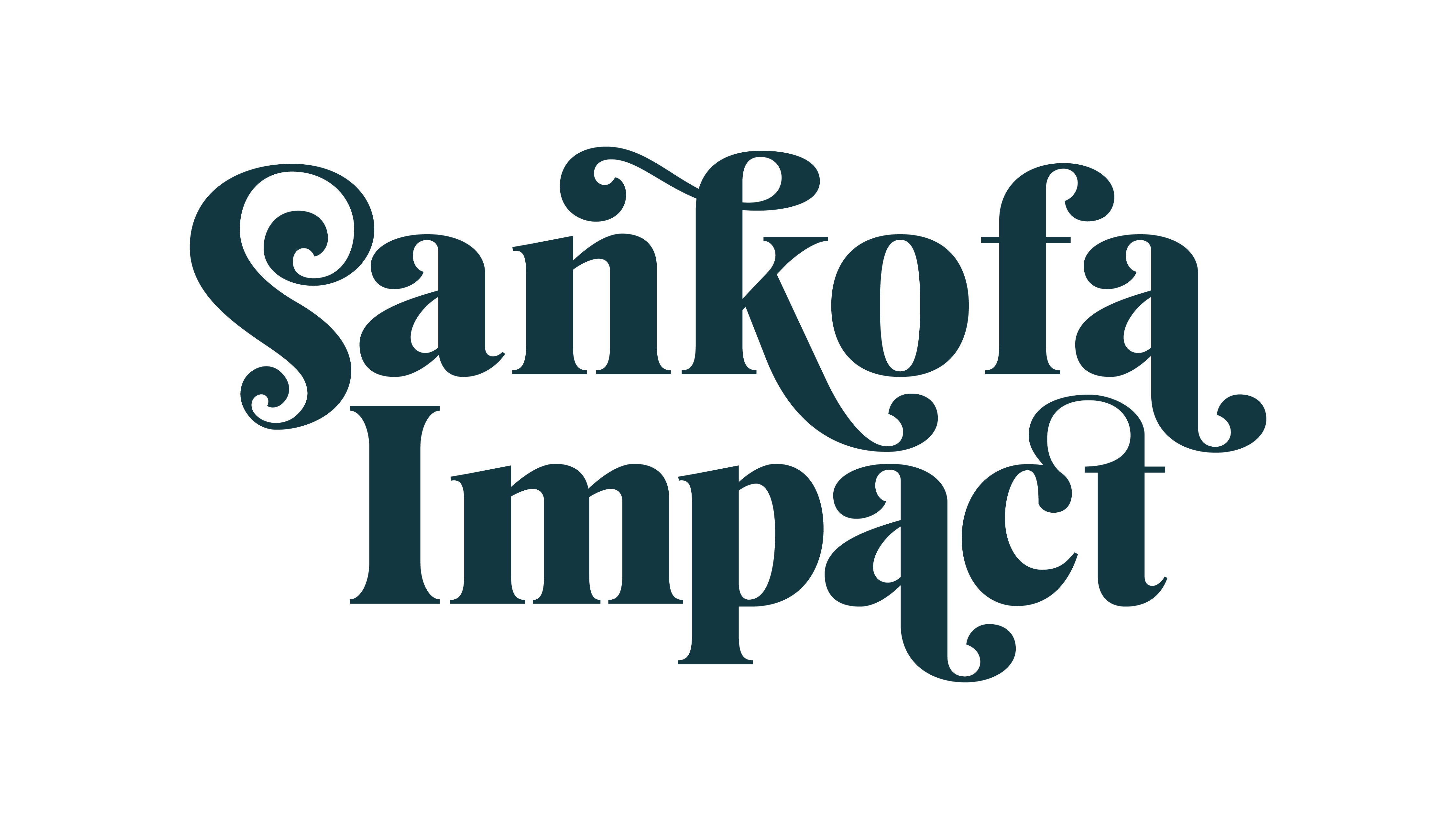Sankofa
A Letter from our Executive Director
This Black history month, I want to touch on three important histories: my own, Project Pilgrimage’s, and Black culture as a whole.
My first encounter with sankofa took place years ago during a trip to Ghana. Sankofa is a Ghanian symbol represented by a bird, feet facing forward and head turned backwards as it carries a precious egg in its beak. The translation is, “it is not taboo to fetch what is at risk of being left behind.” The Ghanaian people welcomed me with open arms and everywhere I went, they greeted me with “Welcome home sister! You’ve finally returned!” After years of grappling with the troubled relationship between Black America and White America, I finally had the opportunity to return to a place I’d never been – a place and experience that gave me a sense of belonging that I hadn’t experienced before.
Like my pilgrimage to Ghana, our Project Pilgrimage returns to retrieve American stories of freedom left behind by the civil rights icons we have come to know and love. I’m thinking of Bob Zellner, Bernard LaFayette, Carolyn McKinstry and others we meet along the way. Project Pilgrimage returns to the past so we can fight for our future.
Project Pilgrimage is growing and reaching. Ghana and its symbols like sankofa, have long been a guiding light for those focused on the oppressed peoples of the Black diaspora. The first Sub-Saharan African country to gain its independence from European colonization, Ghana’s connections with the Civil Rights Movement are striking. For example, Martin Luther King, Jr. and his wife Coretta Scott King along with other leaders from the movement attended Ghana’s Independence Day ceremony on March 6, 1957. Every February, indeed, every day, we honor this black history by returning to learn from it.
Together let’s honor our own histories and the plight for freedom for Black people everywhere. Hope to see you soon!
– Felicia Ishino
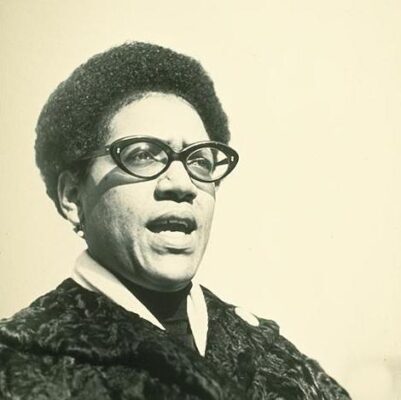
“When I dare to be powerful – to use my strength in the service of my vision, then it becomes less and less important whether I am afraid.”
Audre Lorde
Happy Black History Month!
I hope you all are celebrating and reflecting on the many moments and achievements in the black movement. I am always reflective of the dreams and hopes of our ancestors as well as the journeys they embarked upon for our collective liberation. As we all continue to work for restorative justice and reconciliation, I hope you will take this moment to remember and celebrate the many women, men, children and all the foot soldiers who lost their lives or loved ones fighting for all the right things.
As we continue to bear witness to some of the injustices of our era and contemplate on those of our ancestors, I am reminded of the continuous strides of all the beautiful souls that are continuing the pursuit of our more liberated bodies. I am also reminded of all the pioneers, inventors, creators that charted my path and millions of others. I am grateful for their work and sacrifices. The hope is that the next generation will fare better because of the intentional choices that we make today to cultivate a different reality.
Being a part of this intergenerational and interracial community serves as a reminder that the work continues and I am proud to be learning and moving forward with you all. I wish you all many more black history months and continuous blessing to everyone.
– Pa Ousman Jobe
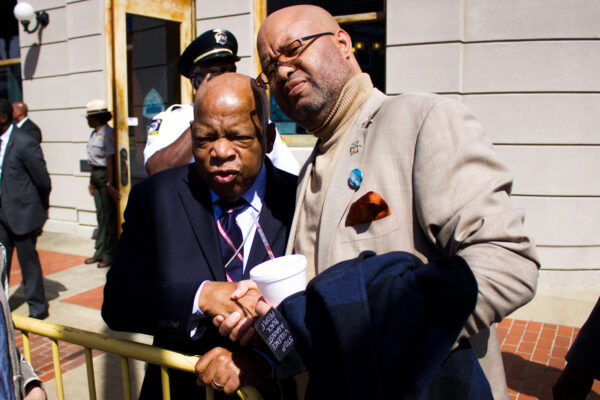
Community Spotlight: Richard Durden
The Pilgrimage came at just the right moment for Richard Durden. At the time, he was an African American Studies student when he first learned about the civil rights trips from his professor and the Project Pilgrimage’s resident historian, Dr. Terry Scott. For Richard, the opportunity to explore the same civil rights era spaces he had been learning about was an experience of a lifetime. “I knew what the trip would be for me. Visiting those sacred, historical spaces, it was a deeply personal experience for me.”
The most impactful part of the trip for him was meeting the foot soldiers who lived and fought through the movement. Hearing their firsthand stories fell heavy on Richard, adding a level of intensity to the trip that he wasn’t expecting. “It’s one thing to get a depiction from a movie or documentary, but to hear from people who actually lived it, gave it more context, made it more real.” It was this humanization that served as a catalyst for Richard, refocusing his energy and reaffirming his desire to one day teach African American studies.
Richard is disturbed by the mistruths and systematic erasure of black history in schools and textbooks. He recalls spending time with Civil Rights activist Joanne Bland on the Pilgrimage, who spoke fervently about the present and past lives that were “taken, not given” in this fight for racial equality. She urged folks to stop being complicit in the softening of Black people’s stories. This hit a nerve with Richard, he realized he hadn’t been paying enough attention. Through education he wants everyone to “know the truth” of the Black America freedom struggle.
Today, Richard is well on his way to becoming a professor of African American Studies, recently completing his Master’s in Education. He’s taking a little time off before starting his last leg of higher education. In the interim, Richard continues to work as a barber, his lifelong profession, as well as an academic advisor at Edmonds community college.
– Jasmine Rose
We still have space available on two very different but equally impactful Civil Rights Pilgrimages this year. Join us on the bus – sign up!
Civil Rights Pilgrimage: Montgomery to Selma
April 30th – May 5th, 2019* travel dates
Application due: March 21st, 2019
Civil Rights Pilgrimage: Changing the narrative through art
October 19th – October 26th, 2019* travel dates
Application due: May 17th, 2019
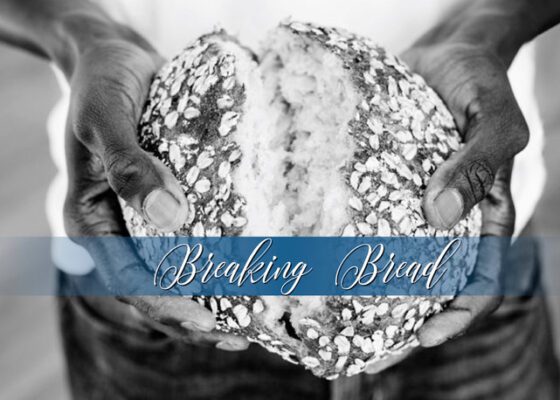
This is what happens when we listen
There is no story without our story.
Breaking Bread launches on March 21st around dinner tables from coast to coast. On this evening we’ll each become a part of a larger community conversation, one about identity, race and experience. We hope you can join us for what is certain to be the start to a community conversation like none other. We have Breaking Bread dinners scheduled to happen all over Seattle, in California and Maryland, Flagstaff, Arizona and Alabama. We couldn’t be more thrilled to begin the conversation.
When we envisioned Breaking Bread we saw ourselves sitting at a dinner table with all of you, sharing stories and a meal, and creating community in the most ancient and intimate way. As we develop and evolve our programming one thing we talk about around our work table is how profoundly doing this work has changed the way we live and connect with our friends and family. The dinner table is a space that comes up time and time again in our conversations. Learning to listen more deeply, and creating space to hear and value everyone in the circle has become a way of life for us.
This small but profound shift in how we listen and share has changed us; the way we show up at our own dinner tables, with our own families and friends, has deepened these relationships. This small act of listening has strengthened relationships in some of our families and repaired relationships in others. We’ve learned that engaging intentionally in this way builds community, we are certain of this because we have experienced the transformation in our own lives, and we are excited to share this with all of you.
– Mary Ingraham
Please join us on one or all of our Breaking Bread nights.
The American Mosaic
Spring 2019 – March 21st
Do you see what I see?
Summer 2019 – June 14th
What is the story of your community?
Fall 2019 – September 12th
The anatomy of gratitude and traditions
Winter 2019 – November 14th
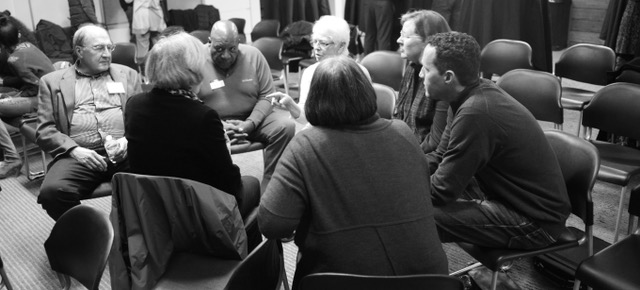
Conversations Across Difference: A reflection on hearing race
Seated in a circle, we— a collective of all different ages, genders, religions, sexualities, races — brought our chairs closer and leaned into the first session of Conversations Across Difference. The intention of the evening is to build community by exploring each others’ worlds; our identities, communities and experiences. One of my favorite exercises asks each participant to listen to their partner share a time when they stood up for someone or someone stood up for them, and then attempt to retell the story from the first person, as if it was their own. So often we speak with someone, but are not truly listening. So often we listen to respond instead of to understand. When I connect over conversation, I remind myself of what activist Georgette Norman says: “listen deeply enough to be changed by what you hear.”
Back in our circle, individuals young and old, diverse in race and experience and story, are hearing each other. They commit to the exercise, embodying others’ experiences – telling their partner’s stories from not only the mind, but the heart. Some say that retelling it makes them envision the experience vividly and begin to feel it in their bodies.
Throughout the evening we speak about race in so many ways. Each time we begin an exercise, I hear it infused so saliently in every story shared. I remain struck by how my race is so deeply interwoven in my responses, perspectives, and experiences. Race is present in everything that we communicate, at all times, when I’m listening deeply enough to hear it.
– Devon Geary
Join us for a future Conversations Across Difference. Each session is from 6:00pm – 8:30pm.
Series II: April 16th + 23rd
Series III: June 4th + 6th
Series IV: September 11th + 18th
Series V: October 2nd + 9th
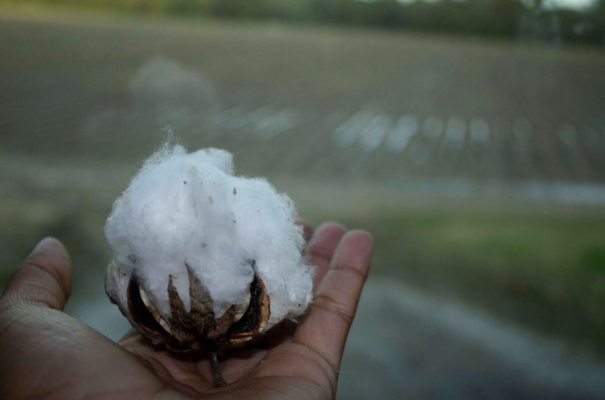
“The ugliest thing in America is greed, the lust for power and domination, the lunatic ideology of perpetual Growth – with a capital G. ‘Progress’ in our nation has for too long been confused with ‘Growth’; I see the two as different, almost incompatible, since progress means, or should mean, change for the better – toward social justice, a livable and open world, equal opportunity and affirmative action for all forms of life.”
Edward Abbey
@project.pilgrimage
QUESTIONS?
Feel free to reach out to us with any questions or comments.
- email: [email protected]
- phone: (206) 688-9820
Join our mailing list to receive updates about Sankofa Impact.
